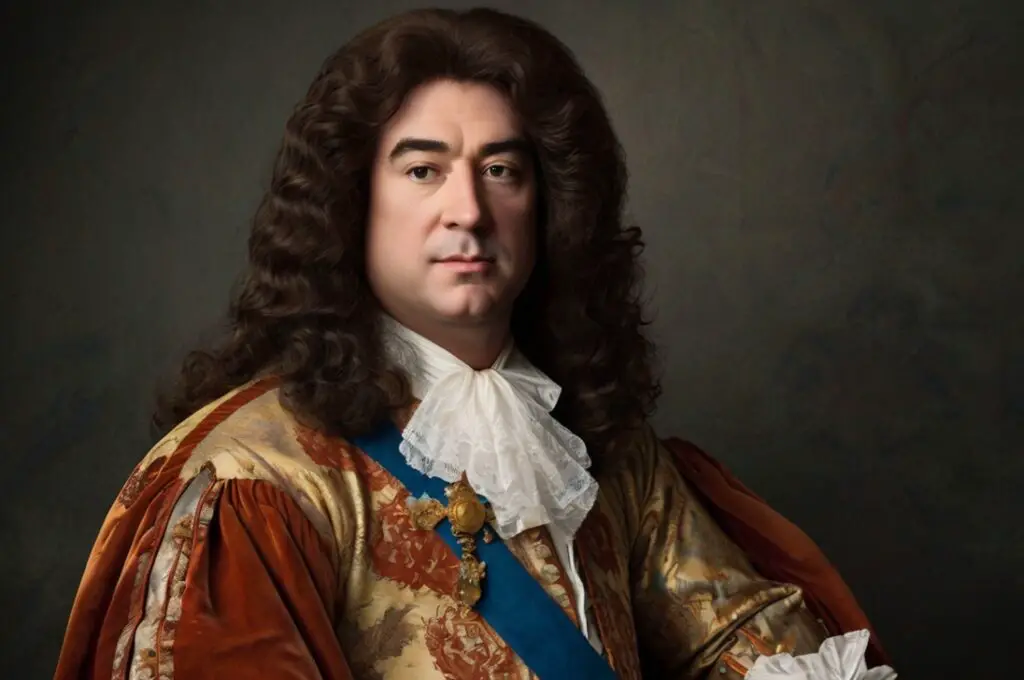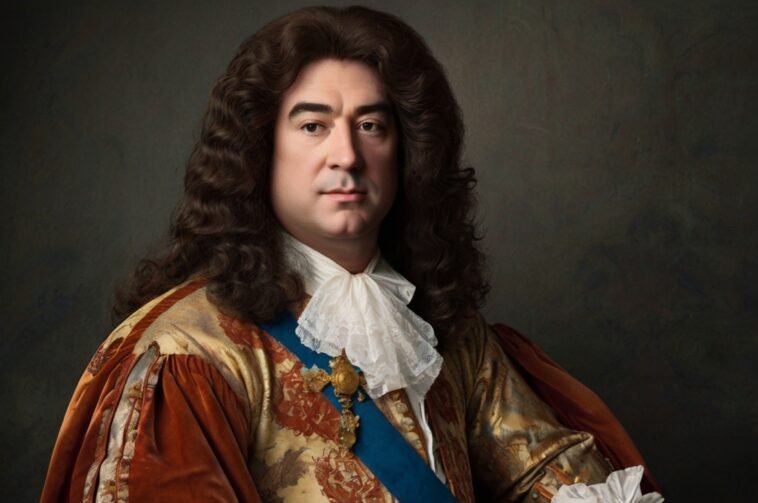
The 17th century was a period of profound change in politics, science, exploration, and the arts.
It was an era where great minds pushed the boundaries of human knowledge, political leaders redefined empires, and explorers navigated the world in search of new lands.
Let’s explore some of the most influential figures of this remarkable time and their lasting impact on history.
Political Leaders
The 17th century was a time of significant political change around the world, with several key leaders shaping the futures of their nations.
Oliver Cromwell (England)
Oliver Cromwell is one of the most important figures in England’s history.
As both a military and political leader, he played a crucial role in the English Civil War, leading the Parliamentarian forces to defeat King Charles I.
After the king’s execution in 1649, Cromwell established the Commonwealth of England, marking the first time the country became a republic.
His rule was controversial; while some see him as a champion of democracy, others view him as a tyrant.
The debate over his legacy continues today.
Louis XIV (France)
Louis XIV, known as the “Sun King,” had an extraordinary reign that lasted 72 years—the longest of any monarch in European history.
His time in power marked the height of France’s influence in Europe.
Louis famously declared, “L’état, c’est moi” (“I am the state”), reflecting his absolute rule.
He expanded French territory through several wars and commissioned the grand Palace of Versailles, which became a symbol of royal extravagance.
Peter the Great (Russia)
Peter the Great was instrumental in transforming Russia from a medieval society into a powerful European state.
He achieved military victories, initiated cultural reforms, and modernized the government.
His efforts to “westernize” Russia brought European advancements in science, technology, and industry, leaving a lasting impact on Russian society.
Tokugawa Ieyasu (Japan)
Tokugawa Ieyasu is known for founding the Tokugawa shogunate, which ruled Japan for over 250 years during the Edo period.
His victory at the Battle of Sekigahara in 1600 solidified his position as the most powerful warlord in Japan.
Under his leadership, Japan experienced a long period of peace, stability, and isolation, along with a strict social order that shaped the country for generations.

Scientific Minds
The 17th century is often called the Scientific Revolution, a time when major discoveries and new ways of understanding the universe transformed history.
Galileo Galilei (Italy)
Galileo Galilei is often referred to as the “father of modern astronomy.”
He was one of the first scientists to use a telescope to observe the stars and planets.
His support for the heliocentric model—suggesting that the Earth revolves around the sun—was groundbreaking and challenged long-standing beliefs held by the Catholic Church.
Despite facing trial by the Inquisition for his ideas, Galileo’s work laid the groundwork for modern physics and astronomy.
Isaac Newton (England)
Isaac Newton is considered one of the greatest scientific minds ever.
He made significant contributions to physics, mathematics, and astronomy.
His book, Philosophiæ Naturalis Principia Mathematica (1687), outlined the laws of motion and universal gravitation, which became fundamental principles in science.
Newton’s discoveries are often seen as the foundation of modern physics and have influenced scientific thought for centuries.
Johannes Kepler (Germany)
Johannes Kepler was a pivotal figure in the Scientific Revolution, known for his laws of planetary motion.
He demonstrated that planets orbit the sun in elliptical paths rather than perfect circles, supporting the heliocentric model of our solar system.
His findings paved the way for future astronomers, including Newton, who built upon his work to develop the theory of gravity.
René Descartes (France)
René Descartes was a French philosopher, mathematician, and scientist often called the father of modern philosophy.
His famous statement, “Cogito, ergo sum” (“I think, therefore I am”), reflects his belief in rational thought as the basis for knowledge.
Descartes also made significant contributions to mathematics, particularly through the development of Cartesian coordinates, which are essential in geometry and calculus.

Explorers and Colonizers
The 17th century was a time of continued exploration, with European explorers and colonizers forging new trade routes and establishing settlements around the world.
Christopher Columbus (Spain)
Although Christopher Columbus’s famous voyage took place in 1492, his impact on the 17th century is significant.
His discovery of the Americas opened the door for extensive European exploration and colonization during the 1600s.
Columbus’s legacy is complex; while he is celebrated for his explorations, his expeditions also led to centuries of conquest and exploitation of Indigenous peoples.
Vasco da Gama (Portugal)
Vasco da Gama was a Portuguese explorer who made history by discovering the sea route to India in 1497, sailing around the Cape of Good Hope.
His voyages were crucial for establishing Portuguese colonies in Asia and significantly influenced the global trade routes of the 17th century.
James Cook (England)
Captain James Cook is well-known for his voyages across the Pacific, where he charted many islands and explored areas that were largely unknown to Europeans.
His meticulous maps and scientific observations laid the groundwork for future exploration and colonization efforts.
William Bradford (England)
William Bradford was a leader of the Pilgrims and served as governor of the Plymouth Colony in Massachusetts.
His writings, especially Of Plymouth Plantation, offer valuable insights into the early years of European colonization in North America and the many challenges faced by the settlers.

Artists and Writers
The 17th century was a remarkable period for art and literature, with many iconic figures leaving a lasting cultural legacy.
William Shakespeare (England)
Although William Shakespeare wrote most of his works in the late 16th and early 17th centuries, his influence continued to expand throughout the 17th century and beyond.
His plays, such as Hamlet, Macbeth, and Othello, have made a profound impact on literature, theater, and the English language, earning him a place as one of the greatest writers in history.
Miguel de Cervantes (Spain)
Miguel de Cervantes is best known for his novel Don Quixote, which is often hailed as one of the greatest literary works ever written.
Published in two parts (1605 and 1615), it is regarded as the first modern novel and has significantly influenced Western literature, introducing themes of reality and illusion.
Rembrandt van Rijn (Netherlands)
Rembrandt is celebrated as one of the greatest painters of the Dutch Golden Age.
Renowned for his mastery of light and shadow, his works, including The Night Watch, are known for their emotional depth and realism.
Rembrandt’s innovative approach to portraiture and self-representation continues to inspire artists today.
John Milton (England)
John Milton was an influential English poet and thinker, best known for his epic poem Paradise Lost (1667).
This work delves into themes of free will, temptation, and redemption, reflecting the religious and political upheaval of his time.
Milton’s writings remain essential to English literature and continue to be studied for their depth and complexity.

Other Notable Figures
Queen Elizabeth I (England)
Although Queen Elizabeth I passed away in 1603, her legacy continued to shape the 17th century.
Renowned for her diplomatic skills and strong leadership, her reign is often called the Elizabethan Age, a time when England saw a remarkable flourishing of the arts, exploration, and global influence.
Marie Curie (Poland/France)
Marie Curie is celebrated for her groundbreaking research on radioactivity, but she was born in 1867, which places her contributions well outside the 17th century.
Her work in the early 20th century had a profound impact on science and medicine.
Johannes Vermeer (Netherlands)
Johannes Vermeer was a Dutch painter celebrated for his stunning use of light in intimate domestic scenes.
His most famous painting, Girl with a Pearl Earring, is regarded as one of the masterpieces of Western art, admired for its beauty and emotional depth.
Molière (France)
Molière, born Jean-Baptiste Poquelin, was a French playwright and actor who transformed French theater.
His comedic plays, like Tartuffe and The Misanthrope, cleverly critiqued societal norms and continue to be performed around the world today.

Final Thoughts
The 17th century was a crucial period in world history, marked by significant changes and influential figures in politics, science, exploration, and the arts.
These individuals made a lasting impact, shaping modern thought and culture in ways that continue to resonate today.
Their contributions helped lay the groundwork for many aspects of contemporary society, reminding us of the importance of innovation and creativity throughout history.



